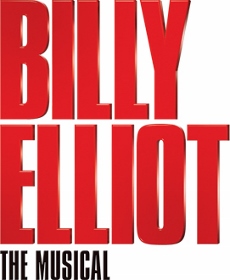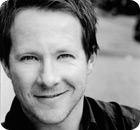THE IMPORTANCE OF A BIG BROTHER
When you hear of Billy Elliot being a phenomenal world-wide success, it is almost shocking that the popular musical (music by Elton John, book and lyrics by Lee Hall) has never played Los Angeles. That all changes this week. The heart-warming story of a young boy from a coal-mining family who follows his passion for dance opens at the Pantages Theatre for a limited engagement now through May 13.
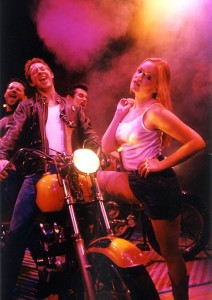 Set during a contentious miners’ strike in England, Billy is expected to become a miner like his brother Tony, his father Jackie and generations before. The penurious family has their middle-class pride tested when they pay for boxing lessons, but Billy is inspired by a ballet class, run by the enthusiastic Mrs. Wilkinson.
Set during a contentious miners’ strike in England, Billy is expected to become a miner like his brother Tony, his father Jackie and generations before. The penurious family has their middle-class pride tested when they pay for boxing lessons, but Billy is inspired by a ballet class, run by the enthusiastic Mrs. Wilkinson.
I spoke with actor Cullen R. Titmas, who plays Billy’s rebellious brother Tony. A year ago, Cullen understudied Tony and performed in the ensemble of the previous tour. That first tour was streamlined to make it more cost-effective, but it provided Cullen the opportunity to audition and land the part of the rebellious sibling. Cullen told me that “streamlining” for this tour in no way means the show looks cheap; simply, the sets are no longer automated or rising up from the floor. This production was re-staged to accommodate the sets, but when you see actors pushing and pulling scenery, that was always a part of Billy Elliott. The engaging actor assures me that the staging is still big enough to fill large houses such as The Pantages Theatre.
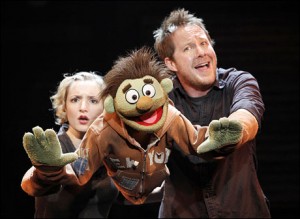 Cullen portrayed the cello-playing Henrik in A Little Night Music and has appeared around the country in such musicals as Footloose (pictured above), Forever Plaid and Avenue Q (pictured left) – the very production that played L.A.’s own Ahmanson Theatre. I was most impressed that he played the astoundingly challenging title role in Adam Guettel’s Floyd Collins in rep with six other shows at The Weathervane Theatre in New Hampshire. He said that Floyd was his best theatre experience and he would do the show again for peanuts (well, he didn’t say peanuts, but for a gainfully employed EQUITY actor, his quote was very reasonable). Equally impressive was that Cullen co-created the role of Marlin in one of my favorite shows, the Broadway-caliber Finding Nemo, the Musical at Disney’s Animal Kingdom.
Cullen portrayed the cello-playing Henrik in A Little Night Music and has appeared around the country in such musicals as Footloose (pictured above), Forever Plaid and Avenue Q (pictured left) – the very production that played L.A.’s own Ahmanson Theatre. I was most impressed that he played the astoundingly challenging title role in Adam Guettel’s Floyd Collins in rep with six other shows at The Weathervane Theatre in New Hampshire. He said that Floyd was his best theatre experience and he would do the show again for peanuts (well, he didn’t say peanuts, but for a gainfully employed EQUITY actor, his quote was very reasonable). Equally impressive was that Cullen co-created the role of Marlin in one of my favorite shows, the Broadway-caliber Finding Nemo, the Musical at Disney’s Animal Kingdom.
The role of Billy is so demanding – he’s on stage for practically the entire 3-hour musical performing several solo dances – that this tour has four actors alternating as the dancing teen. “Working with different Billy’s does keep me on my toes and alters my performance. All of the kids are super-talented and connected to the role, with distinct personalities, but it actually keeps the show fresh. I have a different relationship with each of the kids.”
Which isn’t to say that the role of Tony isn’t demanding, too: “I have to do a big warm-up for each performance because there is a lot of screaming in the show.”
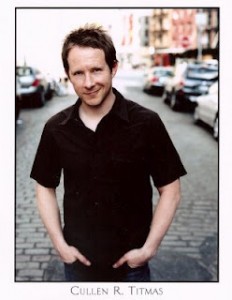 Not having seen the Tony-winning musical, I noticed that reviews rarely describe the performer who is playing Tony. The Orlando Review said that Cullen “hits more emotional notes [than other characters], reacting with fury to his younger sibling’s dreams while showing that under the rage is jealousy and disappointment over his own bleak future.” But other critics describe no more than the actor’s name. Cullen admitted that his role, along with that of Billy’s dad (played by Rich Hebert), rarely gets mentioned in reviews. His theory is that Tony is not very likeable, he’s sort of the “asshole” of the show, and that the role is neither pivotal or extensively written, even as he has major scenes and revelations that are important to the story. Therefore, while Tony and the Dad have extreme arcs within the story, they are the least memorable.
Not having seen the Tony-winning musical, I noticed that reviews rarely describe the performer who is playing Tony. The Orlando Review said that Cullen “hits more emotional notes [than other characters], reacting with fury to his younger sibling’s dreams while showing that under the rage is jealousy and disappointment over his own bleak future.” But other critics describe no more than the actor’s name. Cullen admitted that his role, along with that of Billy’s dad (played by Rich Hebert), rarely gets mentioned in reviews. His theory is that Tony is not very likeable, he’s sort of the “asshole” of the show, and that the role is neither pivotal or extensively written, even as he has major scenes and revelations that are important to the story. Therefore, while Tony and the Dad have extreme arcs within the story, they are the least memorable.
But these roles are not meant to be extraordinary, added the New York-based performer. This is not standard Broadway, such as Ragtime where each person has an eleven o clock number. “The show is not really written like a standard musical – it’s dance-focused. My role supports Billy’s journey, which is what the show is about.”
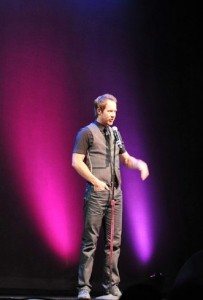 Then Cullen added something that whetted my appetite to see the show more than anything else I have heard: “You may be disappointed if you come expecting hummable tunes. The music in Billy Elliot is used to serve the story and heighten the drama.”
Then Cullen added something that whetted my appetite to see the show more than anything else I have heard: “You may be disappointed if you come expecting hummable tunes. The music in Billy Elliot is used to serve the story and heighten the drama.”
“People go expecting to see a typical Broadway show, which this is not. It’s a unique show and story told in a distinctive, authentic, touching, dark, and exciting way. If you’re into a great story, you will see how many elements are used to support that story. Right when it brings you up to the top and you’re smiling and crying, it brings you right back to the darkness within the story. I can guarantee you will cry at least once, laugh once, and have some sort of deeply-felt sensation when you leave.”
Thusly, Cullen sums up the appeal of Billy Elliott: “When audiences leave the show, they aren’t quibbling over how great each song is, or the size of the sets, or if they couldn’t understand the authentic dialects. All they know is that they were moved, touched and inspired.”
Billy Elliot
NETWorks Presentations, LLC
Pantages Theatre in Hollywood
ends on May 13, 2012
National Tour continues until April 28, 2013
for tour dates and tickets, visit Billy Elliot
